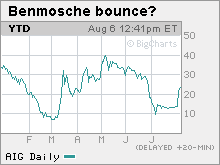Rolling the dice on AIG
The taxpayer-owned insurer, much derided for its blunders in the derivatives casino, becomes a highly sought-after lottery ticket.
 |
| AIG chief Ed Liddy is set to surrender the reins to Robert Benmosche on Monday. |
 |
| Wednesday's spike came two days after AIG named a new chief. |
NEW YORK (Fortune) -- Less than a year after it nearly brought down the financial system with a misguided derivatives bet, AIG is everyone's favorite lottery ticket.
Shares in the troubled taxpayer-owned insurer have nearly doubled in the days leading up to Friday morning's scheduled release of second-quarter earnings. It is a flurry of speculative enthusiasm that boggles the mind.
Yes, the New York-based company is under new leadership, with former MetLife (MET, Fortune 500) chief Robert Benmosche due to take the reins from Ed Liddy on Monday. AIG (AIG, Fortune 500) has also made some modest progress in selling assets, putting it in position to start repaying some of its government loans.
There is even talk the insurer may have stopped bleeding this quarter: The two analysts who cover AIG, which was bailed out by the government last fall after a huge derivatives bet blew up, expect it to make $1.67 a share -- its first profit since the end of 2007.
Even so, given the scope of AIG's problems -- it reported a $99 billion loss last year and survived last fall's market meltdown thanks only to $180 billion in federal support -- it's hard to square the rally with the company's grim outlook.
"The speculators have jumped in on this one, like all the other dregs of the state," said Joe Saluzzi of institutional broker Themis Trading. "These stocks have become trading instruments, and they do what they do."
One factor that could be at work is a so-called short squeeze, in which a rising stock price forces those who have bet the shares would fall to buy stock to cover their positions.
Short sellers borrow stock and sell it with the hopes of buying it back later at a lower price. The cost of borrowing AIG shares for the purpose of selling them short has doubled this summer, said John Tabacco of LocateStock.com, a firm that provides financial data to hedge funds and other traders.
"This is truly a phenomenon," Tabacco said. "I don't know what is going on, but it appears to be the new game in town."
Of course, AIG wasn't the only deeply depressed financial stock to stage a stunning midweek rally. While AIG jumped 63% Wednesday, its government-controlled peers Fannie Mae (FNM, Fortune 500) and Freddie Mac (FRE, Fortune 500) -- which were taken over last September as mortgage losses ate through their thin capital bases -- rose 30% and 31%.
The state-sponsored financial losers weren't the only big winners. CIT (CIT, Fortune 500), the small business lender that was recently denied a federal lifeline, jumped 38%. Mortgage insurer Radian (RDN) soared 83% Wednesday after the firm posted a surprise profit.
The good news was that Radian paid out much less in insurance claims on the mortgages it insures than it had forecast. That could be good news for other insurers, such as AIG.
But analysts at CreditSights said they see it as "highly unlikely" that Radian will make money either this year or next.
Similarly, while AIG could swing to a profit in the second quarter, it's clear that the company remains deeply troubled. The firm did a 1-for-20 reverse split at the end of June in a bid to avoid being delisted by the New York Stock Exchange. In a reverse split, a company reduces the number of shares outstanding in order to boost its stock price, but the value of the company does not change.
"No one does a reverse split unless they're in real trouble," Saluzzi said.
And while taxpayers are getting a trickle of money back via dividends from most of the banks that took federal funds in the Troubled Asset Relief Program, they aren't getting anything for the billions they have lent AIG.
The company owes Treasury a 10% annual dividend on the $41.6 billion in series E preferred shares it sold the government in its latest restructuring in April. That means taxpayers are entitled to a check for $1.04 billion every quarter.
But unlike most of the preferred shares issued under TARP, the AIG series E shares are "noncumulative" -- meaning that the company can skip dividend payments without the obligation to make up the difference later.
AIG was due to pay its latest dividend Aug. 3, according to Treasury data at FinancialStability.gov. But AIG didn't declare the dividend, an AIG spokeswoman said.
On the bright side, should AIG miss three more dividends, the government will have the right to nominate two directors to its board -- further consolidating its control of an entity of which it already owns nearly 80%.
"We wish we knew what was going on with this stock," said Saluzzi. "We just hope long-term investors don't get swept up in this."
Talkback: Do you think AIG's stock is worth buying? Share your comments below. ![]()
-
 The retail giant tops the Fortune 500 for the second year in a row. Who else made the list? More
The retail giant tops the Fortune 500 for the second year in a row. Who else made the list? More -
 This group of companies is all about social networking to connect with their customers. More
This group of companies is all about social networking to connect with their customers. More -
 The fight over the cholesterol medication is keeping a generic version from hitting the market. More
The fight over the cholesterol medication is keeping a generic version from hitting the market. More -
 Bin Laden may be dead, but the terrorist group he led doesn't need his money. More
Bin Laden may be dead, but the terrorist group he led doesn't need his money. More -
 U.S. real estate might be a mess, but in other parts of the world, home prices are jumping. More
U.S. real estate might be a mess, but in other parts of the world, home prices are jumping. More -
 Libya's output is a fraction of global production, but it's crucial to the nation's economy. More
Libya's output is a fraction of global production, but it's crucial to the nation's economy. More -
 Once rates start to rise, things could get ugly fast for our neighbors to the north. More
Once rates start to rise, things could get ugly fast for our neighbors to the north. More







